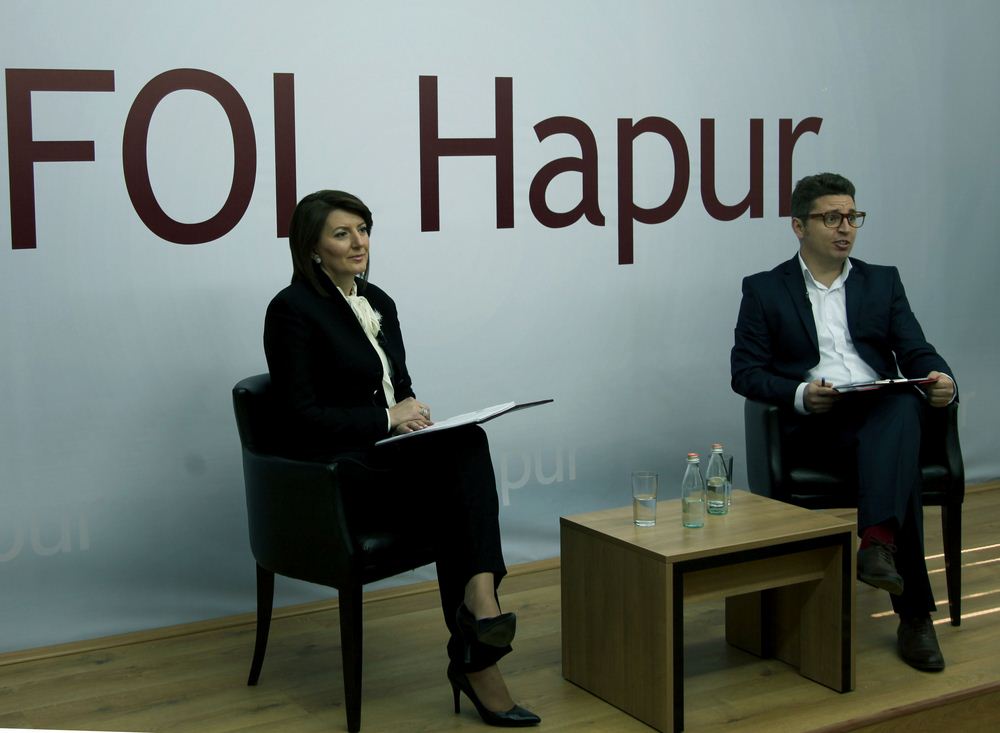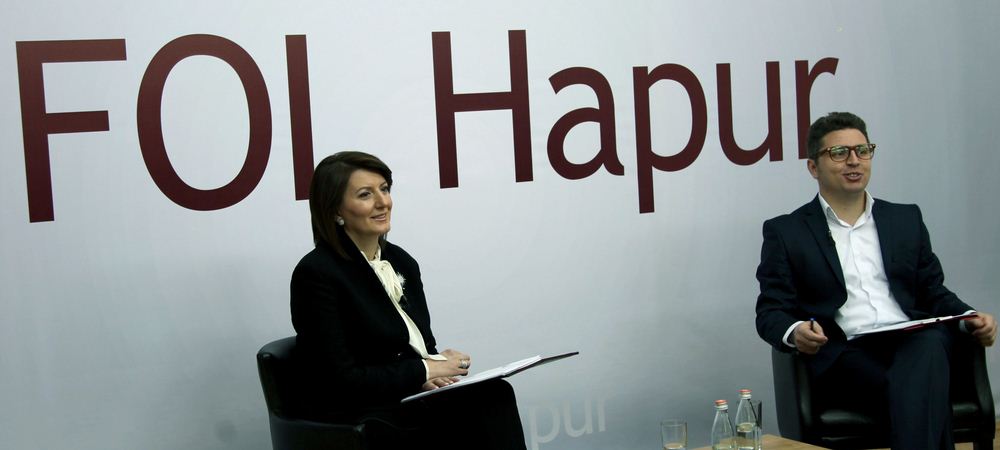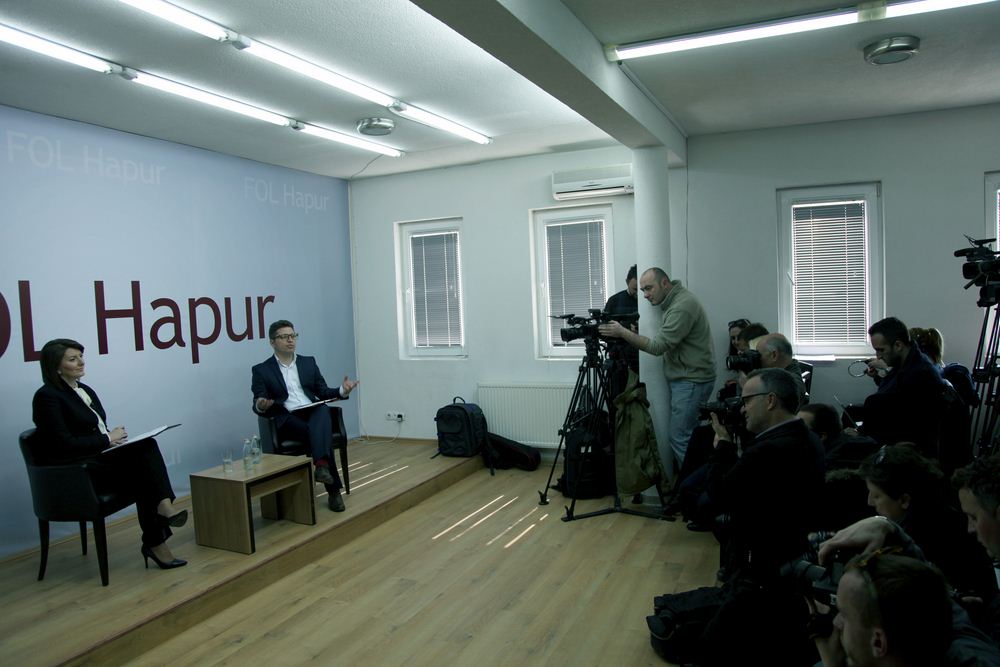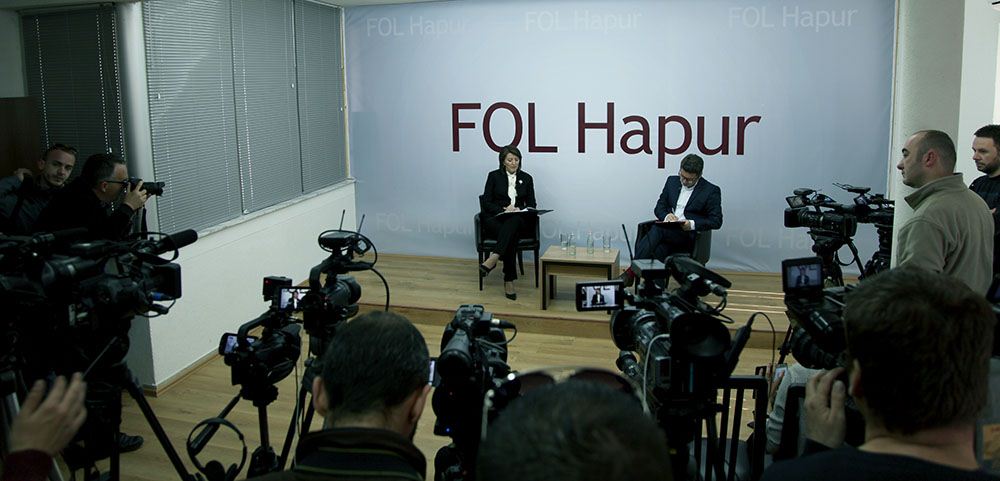Thank you for the invitation to be a guest of this debate today. I do not believe that there would be a more appropriate date for this than today’s Constitution Day of Kosovo anniversary, to share with you some of my impressions about the constitutionality and legality in Kosovo, building of Kosovo’s statehood, rule of law and internal and external consolidation of Kosovo in this first decade of our state forming.
Honourable participants,
Thank you for the invitation to be a guest of this debate today. I do not believe that there would be a more appropriate date for this than today’s Constitution Day of Kosovo anniversary, to share with you some of my impressions about the constitutionality and legality in Kosovo, building of Kosovo’s statehood, rule of law and internal and external consolidation of Kosovo in this first decade of our state forming.
I speak before you today enriched with four years of experience as the President of the Republic of Kosovo, period which, I have gone through in continuous endeavours to stabilize the institution which I have the privilege to lead, and redefine the role of the President in building of a pluralistic and institutional life of the Republic of Kosovo, by enlivening the constitutional principles which form the foundation of our democracy and guarantee the viability of Kosovo as a state.
Due to time limitations and my preference to spend most of our time in a joint dialogue, I will not recapitulate my activities, but will concentrate on my impressions, or rather more in lessons I have learned from my institutional experience.
In 2011, I inherited a politicized office which paid the price for intrusion in daily politics. The Office of the President of Kosovo was seen by the public and voters as a part of the coalition agreements made between two or more political parties. As the post of the President and of the Prime Minister were divided between the two, conditionally, largest parties of the coalition, The Office of the President was perceived as the institutional manifestation of the party which held this post. This made the Office of the President become part of daily politics, which is not a prescribed description of constitutional obligations of the President and which, unfortunately, deformed the role of this institution. Therefore, due to this wrong picture of the competencies of the President, there was a discrepancy between the constitutional role of this institution and perceptions of the competencies of this institution. Furthermore, during the first four years of the existence of our state, we were witnesses of two Constitutional Court rulings which resulted with two resignations from this post.
For this reason, as the first consensual and non party President in the history of independent Kosovo, my first task was to de-politicize the Office of the President and open it to the citizens and to all political parties, to whom the citizens of Kosovo have cast their votes. It mattered very little during my mandate if those political subjects had the majority or minority of seats in the Parliament. It had little relevance if they had criticized or contested me. As the President of the country, my constitutional obligation was to respect the vote of the citizens of Kosovo and to ensure that at the Office of the President, country’s highest institution, the voice of everyone with a care for the functioning of our democratic order was heard. And for this role to ensure the full respect for the constitutionality and legislation of Kosovo, neutral towards political parties, but uncompromised in protection of constitutional principles. Overcoming of political blockade in forming of institutions of Kosovo is a testament to this dedication.
Our Constitution is specific in promotion of joint decision making of the President and Prime Minister in state policies, in determination of so called red lines of national interest. Also, the Constitution provides for decision making between these two offices to be part of negotiating process of checks and balances. But, the greatest power that Constitution provides to the President is exactly the value of this office as a guarantor of democratic functioning of the three separated branches of power: Legislative, Executive and Judiciary. This, I remind you, is the first constitutional duty of the President of the Republic as a guarantor of democratic functioning of the country and a factor of unity.
It is exactly under this Article, Article 84.2 of the Constitution, where I have found the necessary legal space to redefine the role of the President of the country, conceptualizing it to be a unique role in inter institutional coordination which raises the efficiency, transparency and accountability of institutions in fulfilment of their mandate, and at the same time protecting the constitutional division of power and autonomy of each institution.
Upon this constitutional fundament, I successfuly coordinated the fight against violent extremism and radicalization, thus making Kosovo an international example in facing of a common challenge of national security, which today touches upon all European states.
Through the National Council on European Integrations I have ensured social and institutional consensus on Kosovo’s Euro-Atlantic vision, and have also addressed different challenges such as illegal migration of institutional mobilisation and clear separation of responsibilities of fulfilment of visa liberalisation criteria by the month of May.
Through the National Council on Survivors of Sexual Violence during the War, we have not only made unacceptable the continuous stigmatization of the victims, but we have ensured legal protection and economic opportunities which ensure more dignified lives. In fighting against corruption I have coordinated the activities of institutions mandated with fighting of organised crime and corruption. Even though personally I am not satisfied with the institutional response to this phenomenon which is shaking the future of Kosovo, through coordination we have managed to identify the problems. Today, they have
a name and an address.
Here, I would like to move on to the rule of law and order.
I would like to emphasize the necessity that our state is led by one of the most important values of the Constitution, that of equality in front of the law. In front of the laws of the Republic of Kosovo we must all be equal. To enliven this principle, we must still work to obtain a justice system uninfluenced by politics. Our justice system, as it is foreseen by the Constitution, must be unique, independent, just, apolitical and indiscriminate. This remains an aspiration, realization of which is conditioning our viability as a state, the faith of our citizens in their state and the attempts of the society to place Kosovo firmly in its integrative processes.
Rule of law and order, building of a state of law, are closely linked to our integrative processes. We need more determination in fighting of corruption and organized crime, which translates in more concrete results. There are many examples of states which have advanced their integrational agenda by daring to seriously face the organized crime and corruption. Endeavours are joint, of both the institutions and society as a whole. Fight against corruption cannot be stopped and prevented. We have identified and solved many problems at the National Anti Corruption Council, but the greatest burden lies upon the institutions which have the executive competencies in investigation, indictment and conviction. I know that much much more work is needed and I have constantly reiterated the fact that the further away politics remains from this system, the better it would be and we could guarantee the implementation of the laws. Everything is connected to the rule of law and order. Economic development, establishment of favourable business climate, foreign investment, are all related to security, meaning the state of law. We must understand that there is no democratic, developed, advanced state without rule of law.
I am dedicated to building of state where rule of law and order prevails. I have demonstrated this determination of mine in many instances, just because I am convinced that Kosovo’s viability depends upon strong institutions based on the oath to work with honour and dignity.
Aspiration for a Kosovo a state of law, is linked to the installation of this mindset and all encompasing reforms in our society- reforms in healthcare, in education, in the justice system. Today we are still faced by the solvable problems which require nothing but will, as does for example the non transparent public procurement. Such a situation is unacceptable, as is unacceptable the intrusion in the autonomy of the justice institutions, which must be the pillars which regenerate our values and guarantee the improvement and reshaping of our system.
Much has been said about the nomination of the State Prosecutors. In this issue, I would like to remain a little more reserved, as I have not as yet reached a decision, the right and obligation under my discretion. The prolonging of the process has not occurred and will not occur in my office. The mess created is a consequence of a protraction of many months. This prolongation has brought to surface many problems faced by the Kosovo Prosecutorial Council, as one of the most important pillars of the rule of law. I shall reach a decision in a manner in which I have taken all other decisions, based upon the Constitution and the law. It is of importance to me that decision is taken in order to become a standard based upon due process and credibility. Proposal is under review, time space given by law, and this review time does not cause institutional vacuum and it will not be in function of any political bargaining.
And the last part which I would like to share with you today, dear participants, has to do with Kosovo’s international consolidation
.In these four years, there has been no greater honour for me than to be Kosovo’s Ambassador at all four corners of the world. I say this with utter honesty, that there was no greater privilege than to share with the world audience our story, of a society under repression, ethnic cleansing and in risk of its existence, which never gave up the dream of making a state. And even now, when Kosovo’s independence is contested by certain centres, we have demonstrated that it is irrevocable. That our aim is building of a sustainable Kosovo, of a long term concept.
For this reason, investment in internal stability and functionality is very important, because it reflects in our external subjectivity.
After the proclamation of independence, Kosovo needed to prove itself as a state, in strengthening of its external legitimacy through bilateral recognitions, membership in regional and international initiatives, by building of political, cultural and economic bridges, strengthening of relations with our strategic partners which will advance bilateral relations and strengthen our common values.
Majority of the countries of the world and of the EU recognised us as an undeniable reality, as a factor of peace and stability.
Our aim was to create a clear orientation which focused on partnership with different countries of the region and of the world, strengthening of economic cooperation and primary priority, that of EU and NATO membership. This policy was based upon certain principles: promotion of European integration, transatlantic partnership and friendship, regional and multilateral cooperation and economic cooperation.
Today we live in a world which is constantly changing, and alongside this our ability to adapt must change. For as long as our Euro Atlantic orientation remains the only alternative, we must create alliances and new opportunities particularly in economic field. At the same time, still a lot remains to be done and many investments must be made regarding our image abroad.
European integrations process is the most irreplaceable option with greatest influence in transformation of our economies and our policies.
In our journey towards European Union integrations, we must fulfil all our obligations, because only then may we push our vision and our agenda of a joint, viable and functioning state ahead, ready for its European and Euro-Atlantic integration.
We are not asking for shortcuts to European Union, but we are asking that whenever we are ready , the Brussels is ready too.
During the last months I have continuously met with responsible institutions, but also through the National Council on European Integrations, in order to efficiently coordinate and expedite the fulfilment of remaining technical criteria as per visa liberalisation dialogue. We have agreed that all technical recommendations are addressed by the month of May. I am convinced that finally this dialogue will be enforced and successfuly concluded.
At the beginning of summer we also expect to sign the Stabilisation-Association Agreement, which marks a new chapter in Kosovo’s relations with European Union and approximation of our country to the European family. Commencement of the implementation of this agreement will place Kosovo at the centre of EU’s enlargement policy of the region. And a concrete commencement of the process of Kosovo’s EU membership.
The EU Project will only make sense when it is concluded by the membership of all of our countries in the European family, as equals, and in cooperation and agreement with each other.
Our path to EU is conditioned by our ability to build good neighbourly relations, which include respect for values held by our societies and for the integrity of our respective countries.
Kosovo will remain dedicated to building of good relations with its neighbours, relations which promote cooperation and mutual trust- a fundamental change for the region which less than two decades ago was engulfed by war.
Building of foundations for a sustainable partnership is not only political determination, but also a necessity if we want to move forward towards improvement of the lives of our citizens. Foreign investors will avoid countries which do not secure stability and economic and political cooperation of the region.
I believe that western Balkans can achieve to become a region with consolidated democracy, advanced region with functioning market economy and a trusted Euro-Atlantic contributor to the addressing of global challenges.




